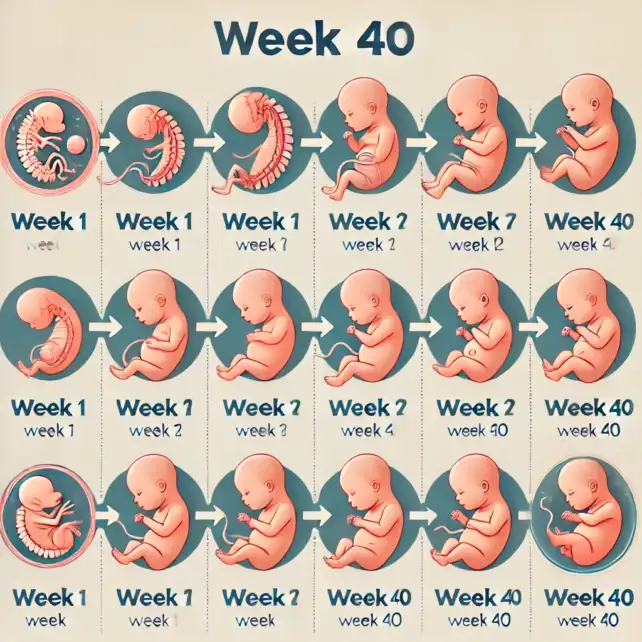Pregnancy is an exciting and life-changing journey, bringing joy, challenges, and new responsibilities. Planning and preparation are crucial steps to ensure a healthy and fulfilling experience for both the parents and the baby. Whether you’re a first-time parent or adding to your family, understanding how to plan and prepare can help ensure a healthy and fulfilling experience. This guide combines expert advice, research-backed information, and tools like our Pregnancy Due Date Calculator to support you every step of the way.
Why Pregnancy Planning is Essential

Pregnancy planning is more than deciding when to conceive—it’s about creating an optimal environment for the health of both the parent and the baby. It involves evaluating your physical, emotional, and financial readiness to welcome a child into your life.
Research from the World Health Organization (WHO) and Centers for Disease Control and Prevention (CDC) highlights that planning pregnancies can improve maternal health, reduce complications, and enhance the overall well-being of the family.
How to Prepare for Pregnancy (Step-by-Step Guide to Pregnancy Planning)
1. Prioritize Your Health
Before attempting to conceive, schedule a preconception health check-up. A healthcare provider can:
- Evaluate your overall health.
- Identify any conditions (like diabetes, hypertension, or thyroid disorders) that need management.
- Recommend vaccinations, such as for rubella or influenza.
- Discuss genetic screenings if there’s a family history of inherited conditions.
Pro Tip: Start taking prenatal vitamins containing at least 400 mcg of folic acid daily to reduce the risk of neural tube defects. (Be sure to talk to your doctor before taking it.)
2. Understand Fertility and Ovulation
Understanding your menstrual cycle is crucial to identifying your fertile window. Procedure the following methods to track your ovulation cycle:
- Basal Body Temperature (BBT): A slight rise in body temperature indicates ovulation.
- Ovulation Predictor Kits (OPKs): These test for luteinizing hormone (LH) surges.
- Calendar Method: Track your menstrual cycles to determine your most fertile days.
- The most fertile period is typically 12-16 days before your next period.
- Consult a fertility specialist if you’re under 35 and haven’t conceived after one year of trying (or after six months if over 35).
Helpful Tool: Utilize apps or fertility monitors for precise tracking. You can also use our Ovulation Predictor Calculator after conceiving to track progress effectively.
3. Adopt a Healthy Lifestyle
Your body becomes the home for your baby, so making intentional changes is essential:
- Nutrition: Prioritize a balanced diet rich in folic acid, iron, calcium, and protein. According to the CDC, consuming at least 400 micrograms of folic acid daily before and during early pregnancy reduces the risk of neural tube defects.
- Exercise: Engage in regular, moderate physical activity. Activities like walking, swimming, or yoga can prepare your body for the physical demands of pregnancy.
- Avoid Harmful Substances: Stop smoking, limit alcohol intake, and reduce caffeine consumption to improve fertility and lower the risk of complications.
4. Emotional and Psychological Readiness
Parenthood involves a shift in lifestyle and priorities. Consider:
- Stress management techniques like mindfulness, counseling, or support groups.
- Open communication with your partner to align on expectations and responsibilities.
- Addressing any past trauma or mental health concerns.
5. Financial Preparation
Raising a child comes with financial commitments. Plan for:
- Health insurance coverage: Ensure it includes prenatal care, delivery, and pediatric services.
- Emergency funds for unexpected medical expenses.
- Budgeting for essentials like nursery furniture, baby clothes, and postpartum care.
- Researching parental leave policies at your workplace.
What to Do After Getting Pregnant
Calculate Your Due Date
Our Pregnancy Due Date Calculator helps you estimate when your baby will arrive. Enter the first day of your last menstrual period or your conception date to get an accurate result. Knowing your due date helps you plan prenatal visits, maternity leave, and childbirth classes.
Ensure Proper Prenatal Care

Regular check-ups and screenings are crucial. A typical prenatal schedule includes:
- Regular Check-Ups: Schedule monthly visits during the first and second trimesters, biweekly in the third trimester, and weekly closer to delivery.
- Supplements: Take prenatal vitamins as prescribed.
- Screenings: Participate in routine screenings for gestational diabetes, anemia, and chromosomal abnormalities.
Your doctor will monitor fetal growth, conduct ultrasounds, and screen for potential complications like gestational diabetes or anemia.
Prepare for Labor and Delivery
- Create a Birth Plan: Document your preferences for labor, pain management, and delivery.
- Educate Yourself: Attend childbirth classes to learn about labor stages, breastfeeding, and newborn care.
- Pack a Hospital Bag: Include essentials like clothing, toiletries, and baby supplies.
Your Pregnancy Journey Starts Here
By following this guide, you’re setting the stage for a healthy pregnancy and a joyful parenthood experience. Don’t forget to use our Pregnancy Due Date Calculator to keep track of your progress and share your journey with your healthcare provider.
Planning for a baby is a beautiful journey—embrace every step with confidence and care.
Common Questions about Pregnancy Planning
Q: How long does it typically take to conceive?
On average, 80% of couples conceive within six months, but it can vary. If conception takes longer than a year, consult a fertility specialist.
Q: What are the most important nutrients for preconception and pregnancy?
Folic acid, iron, calcium, omega-3 fatty acids, and vitamin D are essential for fertility and fetal development.
Q: When should I stop birth control if I want to conceive?
Most methods, like the pill or IUD, can be discontinued immediately, but consult your healthcare provider for personalized advice.
